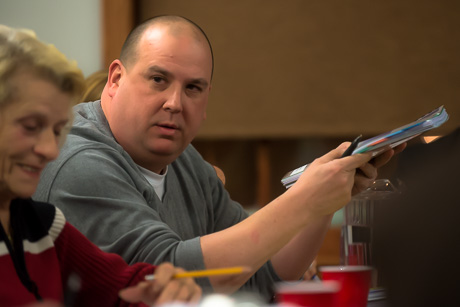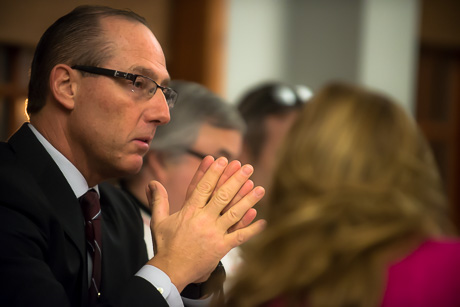In a sometimes testy discussion, Councilman Kris Doeringer wasn't the only official in Vibrant Batavia's corner during a budget workshop Monday night, but he was the most passionate.
He's not arguing, he said, for a bottomless well of money to fund the upstart community improvement group, just another year or two of seed money to ensure it can survive on its own.
"Two years ago, I said I wanted Vibrant Batavia to be self-funded, and I still believe that," said Doeringer (top photo).
The fact that the Centennial Committee, a subcommittee of Vibrant Batavia, was able to raise $125,000 for the city's 100th anniversary celebration is a sign Vibrant Batavia can flourish, but being only 18 months into the venture, and 12 of those months spent on Centennial fundraising, simply hasn't given the group enough time to establish itself, Doeringer said.
"You have to give us time for these things to happen," he said.
That doesn't seem likely to happen. At least five council members sound like they're ready to cut all funding.
John Deleo, Eugene Jankowski (bottom photo), Patti Pacino, Kathy Briggs and Rose Mary Christian all expressed outright opposition to continued funding or indicated they were leaning against further funding.
Vibrant Batavia is asking for $50,000 for 2015 and City Manager Jason Molino recommend an expenditure of $45,000.
The funds are channeled through RochesterWorks, a community organization group, which takes a 5-percent cut and pays for Leanna DiRisio to run Vibrant Batavia.
After the meeting, Council President Brooks Hawley said he feared, without funding, Vibrant Batavia would wither on the vine.
"I believe once that leadership is gone it disappears and there no more vibrant at all," Brooks said.
Adding up the $90,000 paid to consultants at czb to do a needs assessment for Batavia, and $80,000 already committed to Vibrant Batavia to help get it started, if it dies, Hawley acknowledged, that $170,000 investment to try and build a more vibrant future for Batavia goes down the drain.
"From that report that we did, the council spent a lot of money doing that, and they gave us recommendations on how we can improve our city," Hawley said. "That's where BDC came from, that's where Vibrant came from, that's why I don't want to cut the legs from underneath them, but I would like to see, Vibrant, like I said, not do a three-year contract, but do a year-by-year, look at it, gauge it and see. I would like to reduce the funds eventually so they're self-sufficient."
Leading the opposition to continued funding are Deleo, Briggs and Christian, with Jankowski and Pacino professing a degree of neutrality but asking skeptical and doubtful questions.
"The thing I get from my people when they come in is they all think it was great, but they say don't take the money out of my pocket to pay for it," Deleo said.
Briggs said, "They've done a wonderful job, but the taxpayers shouldn't have to pay for it. They don't have to want to pay for it. They want these people to be able to go on their own."
Christian said she's also hearing from constituents on the issue.
"I like Vibrant Batavia, but I've had too many calls and too many complaints," Christian said. "I don't want to give $50K for it and have it go to Rochester, too."
Jankowski said people are concerned about keeping up with the cost of living and therefore want to cut out government expenses.
"It's tough when raising kids," Jankowski said. "The cost of living increases, bills go up and they cut out something, whether it be cable TV or newspaper delivery. They cut what they can possibly cut. This is where people are coming from, those affected by this tax increase, proposed, are getting here and they're reacting emotionally to it and they're saying, 'Do we really need this $50,000 going here? Can't we offset my taxes and save me some money?' I think it's a legitimate question."
Pacino said she was just asking questions to help clarify how the money going to Vibrant Batavia was being spent.
"What are they doing with that money?" Pacino asked. "(Taxpayers) are not going to accept, 'well, it's all coming back to the community.' I believe that. I love this group, but I can't just say it's going back to the community."
Pierluigi Cipollone expressed support for Vibrant Batavia.
"This is an investment," Cipollone said. "It's an investment in our community. It's an investment in our people. Like Kris said, we're not going to see a dollar-for-dollar return on our investment. We're going to see a return in the form of more pride in the city. People cleaning up their streets a little better, helping out their neighbors. That's where the benefit comes from this. To look at this as a mere expense is missing the picture. You have to look at it as an investment in the community."
John Canale said he's heard from one constituent on this issue -- the only time, he said, a constituent has ever come forward on his or her own to express an opinion about anything. That constituent loves Vibrant Batavia, wants to see it continue, but believes funding should eventually be cut off and the group should make it on its own, he said.
In his defense of Vibrant Batavia, Doeringer didn't back down from the debate.
In response to questions by Jankowski and Pacino that seemed to indicate the only money coming back to the community was the money spent on block parties, Doeringer tried to make the case that 100 percent of the city's investment in Vibrant Batavia comes back to the community.
The salary for DiRiseo, though an administrative cost, is money that is being invested in the community, just as the administrative cost of paying council salaries is money invested in the community.
That led to the following exchange between Deleo and Doeringer, with the two council members talking over each other at times.
"Doesn't 5 percent go to RochesterWorks?" Deleo asked.
"Right, we're hiring them to send one of their employees to us."
"So we're down to 95 percent."
"We are paying for their expertise," Doeringer said over Deleo's comment. "We are paying for their training of their employee to benefit our community, so it's 100 percent of the money that comes back to the community."
Christian said she was making her plea to cut funding on behalf the middle class (which apparently includes people who make minimum wage).
"Basically, what you're forgetting is the middle class, and the middle class is really strapped and they really can't afford much more of anything," Christian said. "That's my concern. I mean these things are just out of control. I mean, the minimum wage around here is, what, $8.50 an hour or whatever. You're lucky if they make $30,000. We have all these increases and everything else and nobody has the concern it seems like for the middle class. I'm middle class. Don't you have any concern for me?"
Doeringer said he also was middle class, which prompted the start of a retort Doeringer didn't let Christian finish.
"I hardly think living on Naramore versus living --" with Doeringer cutting her off with a tart, "I don't live on Naramore."
Hawley would like to find a way to continue funding Vibrant Batavia so that the group can continue its work on behalf of the residents and business owners of the community, but he doesn't see funding as something that continues indefinately.
"I don't want to put a timetable on it," Hawley said. "At the most, this year and next year and then that would be it for me. I wouldn't vote in favor after that, but they've only been around for two years. I think City Council needs to invest in them for four years to make sure they have solid footing and go from there. I don't want to see them disappear at all because they do great things in our community."
Before the Vibrant Batavia discussion, Fire Chief Jim Maxwell and Police Chief Shawn Heubusch both discussed their budget requests.
The fire department proposed budget is $3.9 million, with: $2 million in base salaries; $125,000 in overtime; $139,390 in holiday hours; a $35,000 one-ton utility vehicle; $21,000 in professional development and training; a $549,190 contribution to the state retirement fund; and $188,430 for Social Security taxes.
The police budget is $4 million: $2.1 million for base salaries; $220,000 for overtime; $12,000 for the emergency response team overtime; $85,000 for holiday pay; $63,360 for two patrol vehicles; $61,000 for gas; $44,870 for uniforms and body armor; $19,000 for travel and training; $38,000 for new officer training; $539,980 for the state retirement fund; $194,340 for Social Security tax; and $434,610 for medical insurance.
Christian said she would rather see more money go to police.
"I myself would like to see more policemen," Christian said. "I really wanted to have more body cameras for our officers. It's really crazy out there. I don't know if you're familiar with the streets, but I am. I want you to know anything can happen at any time, but I really want them protected and the ability for us to know what's really going on out there."
UPDATE: Here's a breakdown of how the czb report was funded: $25,000 from a state grant for sustainable neighborhoods; $30,000 from a federal CDBG for community planning; $25,000 that came out of a housing loan program in the 1990s (income from that program); $7,000 from the city's 2010-11 budget, for a total of $87,000 -- plus $8,000 of staff time support of the consultants.






